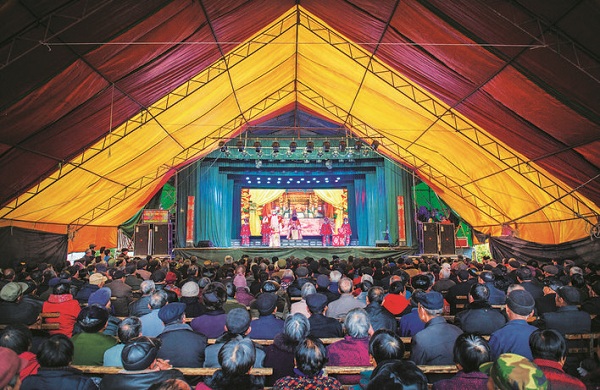
People in rural areas enjoy Wuju Opera performances. [Photo/jhnews.com.cn]
Wuju, a local opera of Jinhua, Zhejiang province dating back to the Ming Dynasty (1368-1644), has been forging ahead in the new era thanks to the city's long-term efforts toward cultural promotion.
From above, the China Wuju Theater looks like a cruise ship moored at Sanjiangkou, which has become a cultural landmark of Jinhua since opening in 2013.
With a total investment of 330 million yuan ($45.47 million), the theater covers 4.33 hectares with a construction area of 31,000 square meters.
It has a large hall with 1,487 seats and a small hall with 242 seats for various kinds of performances such as operas, dance dramas, dramas, symphonies, concerts, and variety shows.
"As a major measure to support the protection and development of Wuju Opera, the grand theater was handed over to us by the local government of Jinhua. This is a great affirmation and encouragement to us," said Wang Xiaoping, director of the Zhejiang Wuju Opera Art Research Institute.
According to Wang, the institute made use of the theater's idle space to build a 1,000-square-meter Wuju Opera Museum in 2016 and better showcase the traditional art form.
In 2008, Wuju Opera made the list of China's national intangible cultural heritage items.
Since 2016, Wuju Opera has been performed in 49 countries and regions, making it popular among overseas audiences and playing a vital role in the province's international cultural exchanges.
In 2020, Wu Opera was listed as part of the first batch of Zhejiang Cultural Imprints, along with the Hemudu Site and the Archaeological Ruins of Liangzhu City.